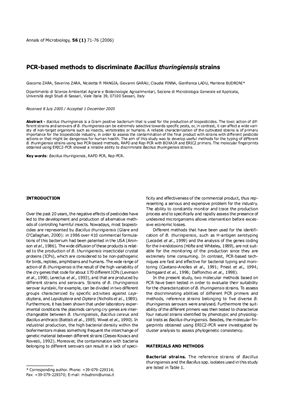Статья опубликована в Annals of Microbiology, 56 (1) 71-76
(2006)
Bacillus thuringiensis is a Gram positive bacterium that is used for the production of biopesticides. The toxic action of different strains and serovars of B. thuringiensis can be extremely selective towards specific pests, or, in contrast, it can affect a wide variety of non-target organisms such as insects, vertebrates or humans. A reliable characterization of the cultivated strains is of primary importance for the biopesticide industry, in order to assess the contamination of the final product with strains with different pesticide actions or that might be dangerous for human health. The aim of this study was to develop useful methods for the typing of different B. thuringiensis strains using two PCR-based methods, RAPD and Rep-PCR with BOXA1R and ERIC2 primers. The molecular fingerprints obtained using ERIC2-PCR showed a reliable ability to discriminate Bacillus thuringiensis strains.
Bacillus thuringiensis is a Gram positive bacterium that is used for the production of biopesticides. The toxic action of different strains and serovars of B. thuringiensis can be extremely selective towards specific pests, or, in contrast, it can affect a wide variety of non-target organisms such as insects, vertebrates or humans. A reliable characterization of the cultivated strains is of primary importance for the biopesticide industry, in order to assess the contamination of the final product with strains with different pesticide actions or that might be dangerous for human health. The aim of this study was to develop useful methods for the typing of different B. thuringiensis strains using two PCR-based methods, RAPD and Rep-PCR with BOXA1R and ERIC2 primers. The molecular fingerprints obtained using ERIC2-PCR showed a reliable ability to discriminate Bacillus thuringiensis strains.

